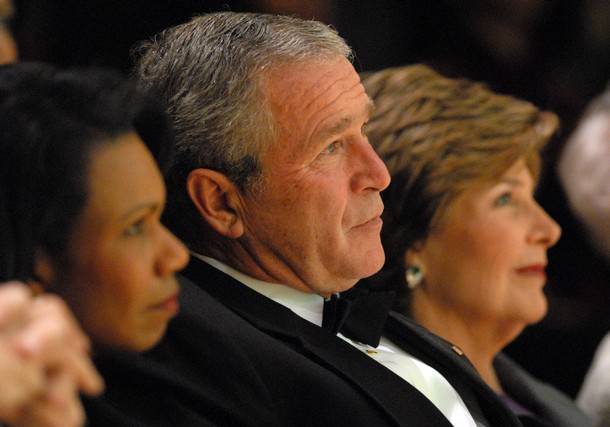Oliver Stone says he believes first lady Laura Bush, secretary of state Condoleeza Rice and presidential advisor Karen Hughes play like “a trinity of Macbeth witches” in the life of George W. Bush,” in the sense that they are totally enablers.” But Stone’s new film “W.” leaves that conclusion to the viewer. “The film foregrounds Bush, and everyone else is shown more or less as we already see them,” he told me Wednesday in an e-mail exchange.
“Rice has no record that we were able to find where she contradicts either Rumsfeld or Cheney, or even does much really to help Powell. She doesn’t seem to do much to bring alternative points of view to Bush’s attention. But an enabler? Yes. If she had threatened him, perhaps she wouldn’t have had the job.”
And Laura Bush would not have had her job either, Stone believes, “had she been more critical of him.”
The Oscar-winning director of “Platoon,” “JFK” and “Nixon” (1995) devoted a great deal of time researching the development of the President’s character, working with his screenwriter, Stanley Weiser. In the end, he said, “this is centrally the story of a man, more than a formal, broad history.”
Stone believes the President’s life falls into three acts, which his film focuses on, while not following such subjects as his elections or 9/11. “Act One is his youth, intermingled with Act Three, his Presidency, and that interconnects with Act Two, his successful middle years. I think overall the most fascinating thing about this incredible President is that he lives up to the American concept of the second chance, and that the second act of his life seems to redeem the first act. The twist on it, to me, is the third act, which becomes a sinister coda to the inauthenticity of his existence.”
Stone was so stung by criticism of his alternative assassination explanation in “JFK” that he edited a massive book attempting to document it. Telling Bush’s story, he stays fairly close to the generally perceived facts, while adding psychological undercurrents such as Bush’s “muscular response to his father as a weak man, and his muscular response to any kind of threat.”
And Laura Bush? “I think the more obvious cliché would be that she was the nagging wife about the drinking, but she doesn’t seem to have been. There is no real evidence of that except Bush saying at one point that it was either him or the Jack Daniels that would have to go. Therefore, we went with the idea that she would forgive him, and that would enable him even more. She would be totally psychologically the supportive wife. Detached? Absolutely. Wouldn’t you be if you had to always play a role like that in your husband’s life?
“In the end,” he said, “she is almost the ultimate perfect first lady. I don’t think there’s been someone like her around since Bess Truman. She seems to make no mistakes, which is eerie.”
Bush’s lack of attention to detail, he says, is underlined in a scene where he is briefed by Vice President Dick Cheney. Looking at a document, he says, “Only three pages! Good.”
I asked Stone: “Born into a patrician family, educated at Andover and Yale, Bush frequently makes elementary grammatical errors, such as using ‘is’ before a plural. How do you account for this?”
“Perhaps a reading disability, or ADD,” he said. “I’m not sure. No one can be in this case, unless he undergoes some kind of medical psychiatric examination, but he seems to be quite disdainful of ‘psychobabble.’ Certainly, his impatience clearly stretches into the way he talks and acts.”
In Act One, beginning with his youth at Yale and continuing during his early days in Texas, Bush is shown as a practicing alcoholic. Fraternity brothers pour Jack Daniels down his throat through a funnel. In scenes after he is “born again,” the film seems to show him continuing to drink beer, but Stone explains: “He’s drinking a known non-alcoholic beer. One of the brands we use is O’Doul’s.”
Did he find anything to back up Bush’s alleged cocaine use?
“I certainly believe that he used it from what accounts I’ve read, but no one inside that group seems to be willing to talk. Kitty Kelley chased it and so did J.H. Hatfield in Fortunate Son. We couldn’t prove it, and so why go there? We already expect minor details to be attacked by the members of the Administration in some way in the next few days. By his own admission, Bush established himself as a reckless young person, and that is the image we sought to create without undo malice.”
Bush’s first secretary of state, Colin Powell, is seen as expressing many doubts but no outspoken dissent.
“Jeffrey Wright [who plays Powell] studied it at length and we discussed it many times. Jeffrey is of the opinion, and I agree, that in the end he was ‘the good soldier,’ which is to say, you follow your commander and fall on your sword if need be. Ultimately, he was not, as a black man, able to resist the white man’s final authority. (Incidentally, you are aware of the fact that he shows up in the My Lai investigation as one of the officers who derailed the investigation in 1969).”
Where would you place Bush on the list of 43 presidents?
“I really can’t say, because I didn’t live through them all. But definitely his are the worst eight years of leadership and responsibility that I have seen in my 62 years. And that means he surpasses Harry Truman and Richard Nixon.”












